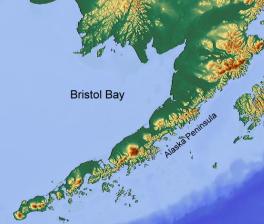 Every year, the Alaskan fishing industry attracts tens of thousands of migrant workers. In remote Bristol Bay, Alaska, between 10,000 and 15,000 fishermen come to work on the salmon boats plying the Bering Sea, while another 6,000 workers or so arrive to process the salmon brought ashore. Salmon fishing brings in $700 million each year to this remote, sparsely populated area. But, as reported by the Counter, with only 15 hospital beds and limited medical resources, local tribal leaders are wondering: Are the risks worth it?
Every year, the Alaskan fishing industry attracts tens of thousands of migrant workers. In remote Bristol Bay, Alaska, between 10,000 and 15,000 fishermen come to work on the salmon boats plying the Bering Sea, while another 6,000 workers or so arrive to process the salmon brought ashore. Salmon fishing brings in $700 million each year to this remote, sparsely populated area. But, as reported by the Counter, with only 15 hospital beds and limited medical resources, local tribal leaders are wondering: Are the risks worth it?
As of June 23rd, Alaska Public Media reports that 12 seafood workers in Dillingham, a Bristol Bay hub town, have tested positive for COVID-19 while under quarantine, sparking anxiety in the small community. The Bristol Bay region didn’t have a single Covid-19 case until May 16. The salmon fishing season starts at the beginning of June.
The 21 rural communities that make up Bristol Bay are only reachable by boat or plane. Spread across a region roughly the same size as Virginia, the total population tops out at just 6,700 people, the majority of whom are Alaska Native.
“The vast majority of our economy is the heart of the commercial fishery,” said Alannah Hurley, executive director of United Tribes of Bristol Bay to ABC News. “It was a hard decision to make but it was a necessary one.”
For the locals, it’s their land — but not their call.
In an official COVID-19 Health Mandate sent out by his office in April, Gov. Mike Dunleavy laid out guidelines for independent commercial fishing vessels to follow while the industry begins its fishing season.
“The State of Alaska acknowledges the importance of our commercial fishing fleet to our economy and lifestyle as Alaskans,” the statement said. “In order to ensure a safe, productive fishing season this year, while still protecting Alaskan communities to the maximum extent possible from the spread of the virus, the State is establishing standardized protective measures to be followed by all independent commercial fishing vessels operating in Alaskan waters and ports.”
Once the fish are caught, thousands of workers stand shoulder-to-shoulder working 16- to 20-hour shifts in processing plants. They eat together in mess halls and then bunk together — in some cases, six to eight people to a room. There are serious concerns about how a virus like COVID-19 can possibly be kept from spreading.
There are also concerns about the fishermen on the boats. At the beginning of June, the Seattle-based factory trawler, American Dynasty, cut short its fishing season after almost 100 of the 126 crew tested positive for COVID-19. Subsequently, four on the American Triumph and 21 on the Northern Jaeger, also tested positive. There are serious concerns that crews on Alaskan boats or fishing boats bound for Alaska will spread the virus.

An acquaintance of mine is working right now at the local bakery. Normally during this part of the year she’d be hopping from one Trident boat to another, doing QC.
Not now. Even while she says Trident is doing the best possible job, with relatives in that part of the world she decided she didn’t want to be part of feeding bad statistics.
More than likely it was a bush pilot that may have brought it to them when doing a supply run.